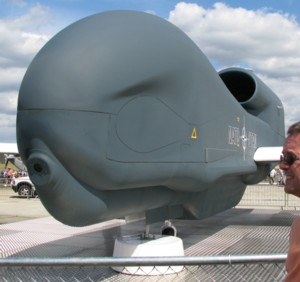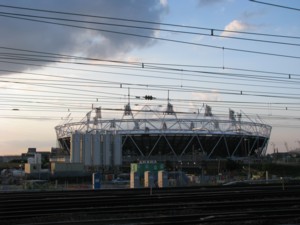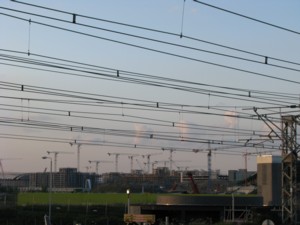We are developing the social individualist meta-context for the future. From the very serious to the extremely frivolous... lets see what is on the mind of the Samizdata people.
Samizdata, derived from Samizdat /n. - a system of clandestine publication of banned literature in the USSR [Russ.,= self-publishing house]
|
Last Saturday, Michael Jennings, Rob Fisher and I went to the Farnborough Airshow, to which, of course, we all brought our cameras. The one with the cheapest and cheerfullest camera tends to take the most pictures, (a) because the pictures tend to be smaller and will fit with ease onto today’s infinite SD cards no matter how many you take, and (b) because with a cheap and cheerful camera you want to give yourself lots of chances to have taken some good snaps, in among the torrent of bad ones. So I took the most photos. There follows a very small selection of these compared to how many I took, and a very large selection compared to how many photos there usually are in Samizdata photo-essays. In the event that you would like to see any of them bigger, click on them. They are shown in chronological order.
Rob’s photos can be seen here. They include quite a few that show what it was like arriving. Rather chaotic, and aesthetically shambolic, in a way that really doesn’t suggest a great show of any sort. Farnborough only happens every two years, and I guess it just isn’t worth organising all the incidentals associated with the public descending on the place for just one weekend every two years, any better than only just adequately. The train from Waterloo (they’re very frequent) having taken about forty minutes (I bought a train-and-bus-included ticket to the show at Waterloo), there was then a satanically convoluted bus journey from Farnborough railway station, smothered in traffic jams of people trying to get to the same spot in their cars, a journey that caused us, in the evening, to prefer to take the same journey back to the station on foot. But we finally arrived at the airfield, where there was yet more too-ing and fro-ing, this time along improvised queue routes, bounded by temporary barriers such as you get around roadworks. We were herded along these tracks and into the show by men in flourescent tops shouting at us. Is this what pop festivals are like?
Mercifully soon we were in, and wandering past further aesthetic shambles, in the form of closely bunched exhibits with euphemistic signs on them about “all your force projection needs” (calling in an air strike when you get into a fight outside a pub?), “delivering ordnance efficiently” (killing people efficiently), “creative solutions” (killing people creatively), “mission specific solutions” (killing exactly the people you want to kill in exactly the way you want to kill them) and so on. Fair enough. The truth is too horrible to be faced head on.
Here was my favourite of these preliminary exhibits:
It’s this. Looks like a whale, doesn’t it? The twenty first century looks like being a golden age of unmanned flight. Who would have thought that model aircraft would turn into a grown-up industry?
Then on to join the main throng next to the runway, to confront sights like this:
This was the moment when I began to fear that I would be without food or water for the next six, hot hours. I could see lots of people, with their own picnic equipment, and lots of other guys with cameras. I could see a big runway, and distant hangers and airplanes. But what if I starved to death? I postponed such thoughts, because just as they were occurring to me, the main show (scroll down to Saturday 24th to see what we saw) was getting under way.
Item one, which I was really looking forward to seeing close up, having already photoed it from far below and far away, in central London, was this:
The A380 did a slow motion impersonation of a plane doing trick flying, going up too steeply and then down too steeply, and then tilting itself too steeply and cornering too much, all with the stately grace of the white elephant that I assume it to be. Beautiful. → Continue reading: At the 2010 Farnborough Airshow
So we live in a society where head teachers make kids wear goggles to play conkers and policemen are forbidden from rescuing drowning people on health and safety grounds… and then they make you drive at 70mph in pitch darkness to save the polar bears?
– Mr Eugenides is not a happy baby concerning the latest environmentally motivated imposition.
I try to carry a digital camera with me at all times. Here is a reason why, which I happened to encounter this afternoon in Victoria Street. It was a seriously cool version of the latest Rolls Royce, which looked to me like it was a particularly scary member of the Wehrmacht:
I particularly liked the intimidating hubcaps, so often an opportunity for gold or silver glitter on cars like this, but here, like everything else, painted in scary military dark grey:
The only gold I could see was the classic Rolls Royce statue on top of the radiator. Click on either picture to get it bigger.
I don’t know what kind of money it was that paid for this vehicle, but I bet it’s quite a story. Failing that, it is the kind of money that at least wants you to think it’s quite a story. Any ideas? The driver wasn’t wearing a uniform, by the way. He was young, and casually dressed. He completely ignored me, although he must have known I was photoing his car. And he must get this a lot.
Many of the relatively new Docklands Light Railway stations I’ve passed through, often being situated on old or new viaducts, or part of similarly elevated main line stations, have offered fine views of the eastern parts of London, which is where many of the big towers are. Yesterday afternoon I took my camera with me in search of more such stations with views. I was not disappointed, and the weather, not good of late, was also on my side.
Pretty much by chance, I found myself at this station:
From this quaintly named viewpoint, I saw what I at first thought was some kind of football stadium. But, it seemed not to be finished. What could it be?
Also, other building was going on not too far away, by London standards. I love a good crane cluster:
But what was it all? Then I saw a weird object looking like a giant deep sea fish. This could only mean one thing: an unpopular sport of the kind that Needs Government Help. This wasn’t football. Of course! This is where the Olympic Games are going to happen:
All those wires in the sky are because regular trains go past this station, although they don’t stop there.
Here’s another picture, relevant to those above, this time of the front page of the London Evening Standard from last Friday:
By us, Mayor Boris means me and my fellow Londoners. Here is the story.
I cursed the day that London got these damn games on the day it got them. It looks like all other London taxpayers will soon be doing the same. And I will be very surprised if all other UK taxpayers don’t end up agreeing, despite what that “Culture Minister” says.
The “GREED IS GOOD” thing concerns Michael Douglas, pictured in the picture, reprising Gordon Gekko. I dare say we will soon all learn that the entire recent economic meltdown was Gekko’s fault. Nothing to do with crazy government monetary policy. But banking, like the Olympic Games, is a nationalised industry, and each is as economically out of control as the other.
Regular Times columist Matthew Parris writes eloquently, if with somewhat sweeping generalisation, about how “we” do not want to hear the truth. “We” do not want change. “We” want things to carry on as they are. “We” want to stay as well off as “we” are, and will snarl and rage at any politician who dares to even hint otherwise. He has a point. Whichever combination of politicians turn out to have lumbered themselves with the grim task of running the next British government will have to cut, cut and cut. So, what should they cut?
Let me prove that Matthew Parris’s generalisations don’t entirely apply to me by suggesting a reduction in some at least of the fluid that I personally now suck from the governmental tit. How about abolishing these?

That thing gives me, at no charge whatever, the run of the entire London Underground network, plus all buses in the same approximate area, plus, if I understand things correctly, free travel on local buses throughout the UK.
I wouldn’t like losing all that, not one bit. But I acknowledge that cuts like this will have to happen, if only to soften the blows a little for others who are being told that they must suffer far worse. Like losing their entire jobs for instance.
Can you, esteemed commenter, suggest other cuts, that you personally would be quite badly hurt by, but which you nevertheless think would be a good thing to do? Or, at least, a cut or cuts that would wound you personally, maybe far worse that losing my “Freedom Pass” would wound me, but which you would find it very hard to argue against? Maybe you have an entire job that you can’t defend and are now ready to admit that you wouldn’t have in a better governed country.
I wonder how Matthew Parris would answer this question.
Or Guy Herbert, whose posting immediately below I had not read when I posted this.
I’m watching the news, in particular the news that the airplanes will be allowed to fly again over Britain. Thank goodness.
Inevitably, a professorial head popped up – Professor Hayward was the name, I think – to argue that what had been revealed was that there were problems with who was in charge. Yes, it must have been the same Professor Hayward as the one quoted in this story. He described the muddle of different jurisdictions – with one Euro-quango governing this, and another that, and France and the UK actually, to quite a large extent – sniff – controlling their own airspace. I don’t know what the Professor really thinks about this, but he or the TV editors made it sound like he thought there ought to be one Euro-authority in charge of everything. There should be, that is to say, a Single European Sky. Recent events, he said, highlighted the fact that there is a muddle of different jurisdictions, when it comes to whether airplanes can fly or not.
And a good thing too. Thanks to that muddle of different European jurisdictions, some planes have been flying over Europe, including one KLM plane which this afternoon flew over London. And the ban is melting away, for all the world as if Europe was still governed by a gaggle of sovereign states, each in charge of its own affairs. No planes have so far dropped out the sky. They didn’t put it like that, but if a plane has fallen out of the sky, they would definitely have said. As more planes have taken to the air, the claim that flying in them is a death sentence becomes harder and harder to accept.
Had European airspace been commanded by a single despot, as will surely be argued by many others besides that Professor in the next few days and weeks, this disaster might have lingered on indefinitely, at a cost (and never let it be forgotten that economic disruption on this scale is, for quite a large number of severely stressed and severely impoverished, severely financially ruined people, a matter of life and death) which would have defied calculation.
Now Paxman is talking about pressure from “vested interests”. Airlines wanting to stay in business, in other words, airlines who have become convinced that this scare has been massively overdone. Airlines who prefer to pay attention to evidence of what is actually happening in the sky, rather than trusting mere computer models. Computer models are getting a rather bad name these day, aren’t they?
If, now that the ban is being lifted, planes do start crashing for mysterious reasons, or if the aircraft maintenance people start to detect the damage that they now say is non-existent in the planes that have already flown, then fine. Ground the planes again. But I’d be amazed if that happened. Airlines know better than anyone that plane crashes must be avoided at almost any cost. It is clear that they think that the risk of crashes now is negligible, for the reasons alluded to in this earlier posting here.
I hope that Simon Jenkins’s phrase, health and safety Armageddon, catches on. My thanks to EU Referendum for the link to that piece, and in general for being all over this story.
But, note that North is today defending the Met Office. North implies that the problem is that muddle of jurisdictions, which has enabled the European commission to evade its responsibility for this mess and heep all the blame on the Met Office. I see what he means, of course I do. But which would you prefer? A muddle of jurisdictions, with all the inevitable buck passing and mutual recrimination, plus pressure from vested interests, and from politicians trying to get re-elected, and derision from bloggers, and by and by from the mainstream media, in short the semblance of a still-free society? Or a pristine tyranny, willing and able to be totally wrong, indefinitely, rather than admit to the embarrassment of being wrong? Widespread panic for a few days? Or, total panic for weeks or months on end, that refuses even to admit that this was what it was? I know which I prefer.
Via Instapundit, is an academic paper on the issue of how merchant vessels can protect themselves from pirates. This will not break new ground for Samizdata regulars, of course, but I recommend it.
Talking of merchant shipping, if this volcanic ash problem continues to mess up air travel, then merchant shipping is likely to get a boost in the short run. Bring brack the transAtlantic ocean liners, maybe. Here’s a website where you can even buy such monsters of the sea. Bit out of my price range, alas.
“What’s really going on, I think, is that the nature of class war has changed. The old virus has mutated. The old social and political divisions have given way to two new classes — rather as on the trains. Those in economy are most of us, paying for the comforts of those in first class. And those in first class are the new political class — all those who owe their advancement and their security and their pensions and their privileges not to their backgrounds or their talents, or even necessarily their political parties, but to the state and our taxes.”
– Minette Marrin
Toyota is recalling thousands of motor vehicles around the world to deal with certain problems, such as possible brake failures. The story was the lead item on the BBC TV news today, not surprisingly, given the large number of people who now drive Toyota cars. On one level, this issue is being billed as a terrible embarrassment for the Japanese company, but to an extent I find the comprehensive recall of the cars to be a pretty good example, in fact, of how private businesses with a huge brand-name investment have to act when their products have a problem. Can you imagine, say, a government department doing such a massive “recall” of a failed policy? With private business, the penalties for failure are bankruptcy. For government, the consequence of a mess is often more of the same, only with more lumps of taxpayers’ money. To put it more technically, there is little in the way of a negative feedback loop when governments are involved.
As an aside, and yes, I know this may seem a bit mean-spirited, but I cannot help reflect that the problems of the Prius cars add to what has been a terrible time for the Green/AGW alarmists. The Prius is very much the car that guilt-ridden, Greenie types like to drive. As the snows continue to fall, who wants to drive one of those machines right now? And in any event, they are just pig-ugly. Time to fire up the Aston Martin, Carruthers.
This story is a fairly nice summary of the icy conditions affecting bits of North America, Asia and Western Europe. Here in London and the Southeast, we are getting snowed on quite a bit; other parts of the UK have been hit even harder.
This time last year, I had cause to snigger at some of the Man-made global warming folk out there and I suppose I was being a bit mischievious, in that AGW alarmists would argue that one or two bad winters hardly undermines their argument, which is true, but then a couple of sizzling summers cannot, by the same logic, be used as confirmation of AGW, either. But much more of this in the next few years, and I would not be at all surprised if public skepticism about the whole AGW issue deepens yet further. One by-product may be changes to transport and the types of cars people use, with more four-wheel drive vehicles coming along (and no, not necessarily SUVs, but smaller ones). And expect sales of these things to rise.
And maybe, this book might get more readers, too. The story, “Fallen Angels”, is about what might happen when governments succeed in massively cutting C02 emissions. Be careful what you wish for.
It is Friday, and I cannot be bothered to ponder the latest outrages of our political oligarchy. For our mental health, let us ponder the lines of this new little beauty from Porsche.
Burn that carbon, baby!
I guess this is a good reason as any not to fly on Ryanair.
|
Who Are We? The Samizdata people are a bunch of sinister and heavily armed globalist illuminati who seek to infect the entire world with the values of personal liberty and several property. Amongst our many crimes is a sense of humour and the intermittent use of British spelling.
We are also a varied group made up of social individualists, classical liberals, whigs, libertarians, extropians, futurists, ‘Porcupines’, Karl Popper fetishists, recovering neo-conservatives, crazed Ayn Rand worshipers, over-caffeinated Virginia Postrel devotees, witty Frédéric Bastiat wannabes, cypherpunks, minarchists, kritarchists and wild-eyed anarcho-capitalists from Britain, North America, Australia and Europe.
|














